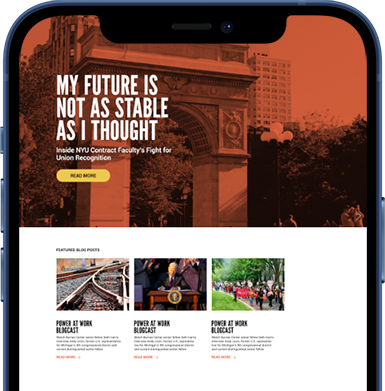Photos by Nicole Rubin for Power At Work
On Thursday, September 21, the graduate student workers at Northeastern University ended nearly 8 years of organizing by voting to be represented by the Graduate Employees of Northeastern University – United Auto Workers (GENU-UAW). The union’s victory was secured with 94% of the votes cast.
The voting occurred over a 3-day period ending Thursday with a final tally of 1,130 yes votes to 70 no votes. At 8:02 p.m. ET, the GENU-UAW X account posted “thanks to all our supporters and to all Northeastern Grads. Solidarity Forever! Now let’s go bargain a winning contract!”
Since its inception in 2015, the graduate student’s organizing campaign has faced determined opposition from the university administration. Graduate students responded with a surge in worker activism that has now resulted in union representation for over 3,000 Northeastern University graduate student workers.
GENU-UAW is the latest to join the wave of graduate workers unionizing in the Boston area. Harvard’s graduate workers organized with the UAW in 2018, the Massachusetts Institute of Technology graduate workers voted for representation by the UE in 2022, and 96% of Worcester Institute of Technology graduate students voted for UAW representation in November 2022.
“It’s a complicated process that many people have never experienced,” said Karl Klare, Professor of Law at Northeastern University. “Naturally, people have doubts about the future. Especially when the university is persistently and for years sending out negative propaganda about unions. The organizers in this case, in my opinion, did a miraculous job of keeping the energy long term.”
The organizing campaign was born of and fueled by demands for fairer working conditions for graduate students. Outlining key concerns such as a lack of childcare, dental care, protections for international students, and wage security in one of the most expensive U.S. cities, the GENU-UAW organizers made their case both inside and outside the university during the campaign.

Graduate Workers rallied in Northeastern’s Centennial Common last spring.
“Very early on [the union] was like a social club for me, like ‘oh I get to meet cool people,’” said Kutub Gandhi, a fourth-year educational games PhD student. “But very quickly it became, ‘I know someone who has a kid, and they have to work very hard to scrape together childcare costs in Boston...’ At the bottom of it all is the cost of living in Boston.”
In addition to personal protections and financial security, union representation provides a bulwark against workplace exploitation. “What the organizers have said, and what I believe to be correct, is that collective bargaining provides a systematic process for airing and discussing disagreements,” said Klare. “What they want is a process where the employer, the university, must sit down and address their concerns... To bring the due process into the institution through the collective bargaining agreement.”
The effort to secure a collective bargaining agreement with the university now looms ahead of the GENU-UAW members. As the graduate students prepare to sit down at the bargaining table, the university must decide whether it will raise legal objections to the union’s election win, which appears to be likely.
On Wednesday, September 20, with voting underway, the university filed a “Request to Review the Regional Director’s Decision and Direction of Election.” This request not only challenges the results of the election, but the legal precedent that allows graduate workers to organize and vote to be represented by a union.
In a 2016 case involving Columbia University, the National Labor Relations Board held that graduate students are “employees” and, thus, are protected by private-sector labor law. The Columbia University decision affirmed that graduate workers are entitled to organize a union and bargain collectively with their employers, sparking a national wave of graduate student organizing.
“It’s heartbreaking for me to say to you that the university takes the position in its legal filings that the Columbia University decision was wrong. If they persist and succeed in that argument, they will not only deny rights to the thousands of graduate workers at Northeastern, they will strip tens of thousands of graduate workers who have already organized across the United States,” said Klare.
Power At Work requested a comment from the university, but did not receive a response prior to publication. In response to the election, Vice President of Communications Renata Nyul wrote in a statement to the Huntington News: “Northeastern applauds those students who took the time to participate in the election. Now that voting has concluded, we will move to the next phase of this multi-step process. Our existing appeal of the proposed bargaining unit and other errors of law is currently pending with the National Labor Relations Board, which has yet to issue a decision. We will assess next steps once the Board rules on our appeal, which may include commencing the collective bargaining process or additional avenues of federal review.”
For Gandhi, the university’s track record on unionization has cast a dark pall over the upcoming negotiations. “There are many universities and many employers who don’t want their employees to unionize... Northeastern has gone above and beyond. Northeastern is one of the very few going to court and challenging our very right to unionize,” he said. “I’m optimistic for when we actually have the contract. I’m less optimistic about bargaining for the contract.”
Despite the potential challenges ahead, Gandhi remains firm: “All of that is to say that this is an indication that the fight’s not over, we need to band together and show Northeastern our power. That’s the way we’re going to get our contract.”

